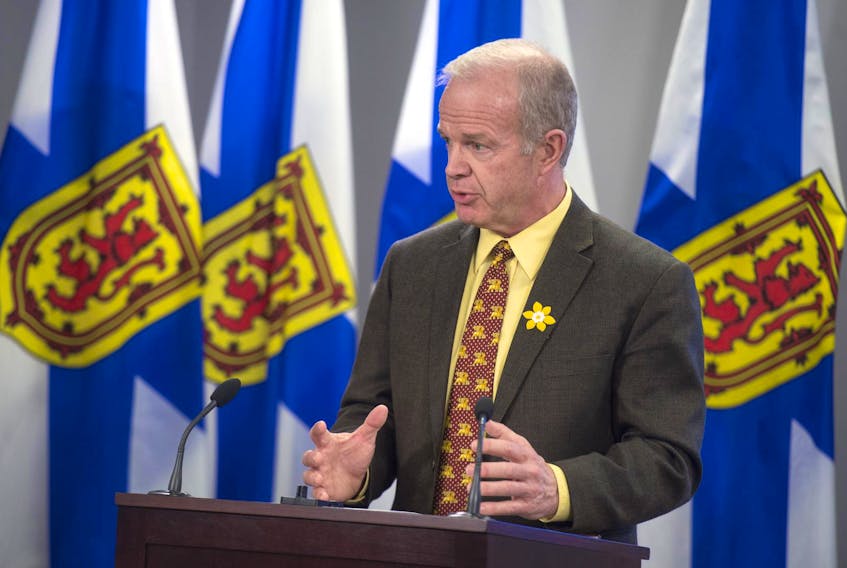Justice Minister Mark Furey’s refusal to commit to a public inquiry two months after April’s mass shooting raises questions about whether the retired RCMP sergeant is more interested in protecting the national force than getting to the bottom of the tragedy, says a lawyer involved in the Lionel Desmond Inquiry.
“It makes people question why is a former officer of the RCMP making these decisions?" said Adam Rodgers. “You wouldn’t question that if the minister showed some leadership and called the inquiry that everyone has asked for, but he hasn’t.”
Rodgers is representing the family of former Canadian soldier Lionel Desmond, who served two tours in Afghanistan before killing his family and himself more than three years ago in Upper Big Tracadie. The aim of the inquiry that began this past January in Guysborough is to layout the specific details of the tragedy but also the underlying circumstances that led to Desmond’s steady decline.
Rodgers said there are many similarities between the provincial government's response to the mass shooting and Desmond’s case. Both cases involve mixed federal and provincial jurisdictional responsibility, but the majority of issues fall under the province’s responsibility, said Rodgers.
In both cases, the premier and Furey initially rejected calls for an inquiry, pushing the responsibility onto the federal government.
He pointed out that the minister never did actually agree to an inquiry with the Desmond tragedy. It was the province's Chief Medical Examiner Matt Bowes who used his authority under the Fatality Investigations Act to force the provincial government to call an Inquiry into the Desmond matter.
"Certainly, there will need to be federal co-operation with any inquiry into the Portapique killer’s actions, and the troubling facts that have emerged about prior knowledge of him that perhaps should have prompted intervention," said Rodgers. "That federal co-operation has been pledged in the Desmond Inquiry, and while there is more expected from them, it has been helpful to date."
Furey, who spent 32 years with the RCMP, has denied that his former position puts him in a conflict of interest in the mass shooting case. In his role as justice minister Furey is in charge of policing in the province and the administration of justice.
On June 4, Furey said he and Public Safety Minister Bill Blair had agreed on a broad joint provincial-federal review/inquiry of the tragedy and that details of what the review would like would be released to the public the following week.
That didn’t happen.
On Thursday, Furey said the final details of the review were being worked out but that the terms of reference would be announced in the near future. Furey and the premier have not called the proposed review a public inquiry, nor has the minister been clear on whether the RCMP or the Nova Scotia government would be forced to turn over all relevant documents under the terms of the review.
“Both Minister Blair and I … are working towards that very objective to ensure that everybody is participating and that the necessary documents and witnesses are made available to this initiative,” said Furey on Thursday.
Rodgers said the provincial government's refusal to take responsibility for the tragedy is unfair, particularly to the families of the 22 victims. So, too, is the premier and justice minister's reluctance to define exactly what the review will be. He said those families and Nova Scotians have a right to expect their government to take swift action in response to the deadliest mass shooting in Canadian history.
“That they continue to deflect responsibility is very troubling to watch for those people emotionally invested in this tragedy, to see the back and forth of our government trying to push responsibility on to somebody else and not really showing leadership, (is) very troubling."
The RCMP has faced heavy criticism for providing limited details of the actual event itself. Rodgers believes that the RCMP would be forced into being more transparent if the province had committed to a public inquiry by now.
“It would help ensure that all parties, including the RCMP, approach the issue of public disclosure in a proper, fulsome, manner at an early stage," said Rodgers.
"Knowing that the facts will eventually emerge in full in an inquiry setting may preclude what we are seeing in the slow process of disclosing the Informations to Obtain relating to the searches of the Portapique killer’s properties."
He said heavily redacted search warrants suggest the RCMP is pressuring the Crown to hold back a considerable amount of information that should be public at this stage. If the RCMP knew an inquiry was coming, perhaps it would be taking a different approach, said Rodgers.
In the end, he said there must be a public inquiry into what is an unprecedented event. Whatever review that is decided must also allow the person in charge of overseeing the review, to compel witnesses and evidence in the same way that a civil court would.
“In other words, you could have anyone come and order them to disclose documents, that’s a powerful element of a public inquiry," said Rodgers.
"That’s key, because if you can’t and you’re relying on the information that’s voluntarily provided there’s no way you can expect the best outcomes."









